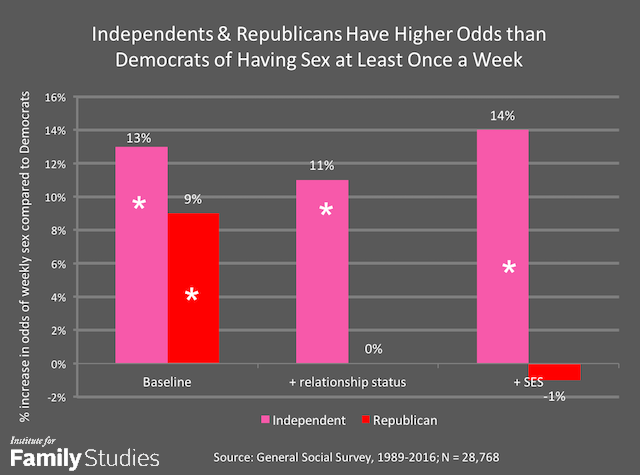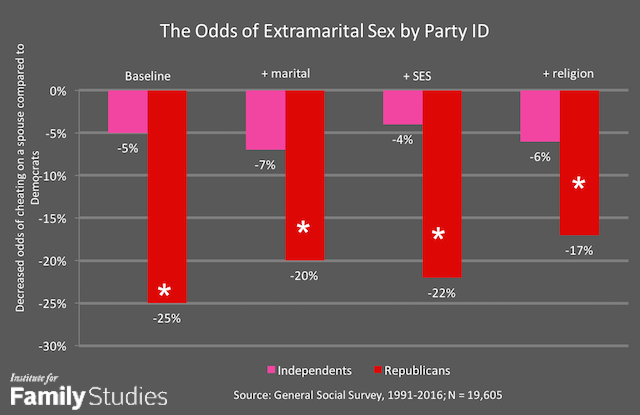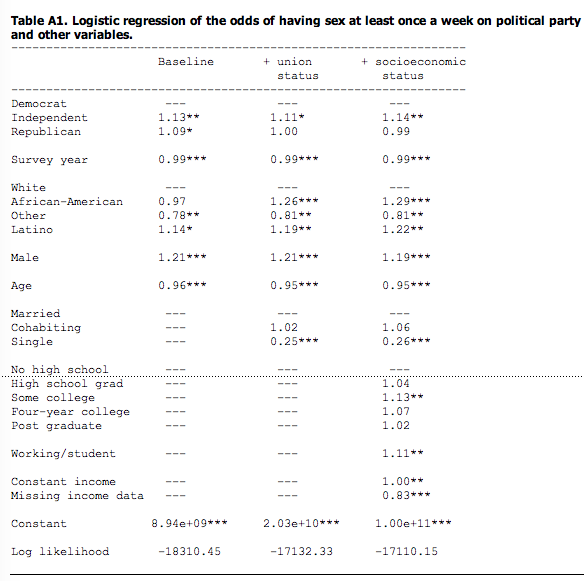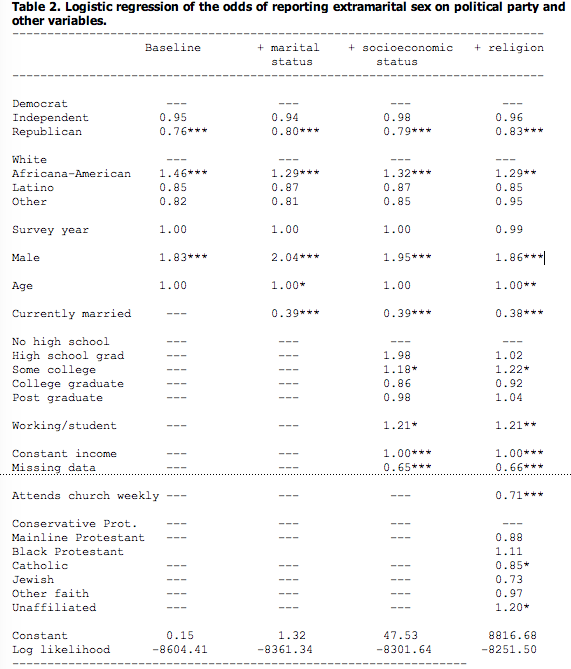Highlights
Editor’s Note: The following article is our second most popular blog post of 2017.
Sex—who does it, how often, and with whom—occupies a central place in the public imagination. And rightly so: Sex plays an important role in the quality and stability of men and women’s lives and relationships. Politics are also on our mind a lot, especially given an era of mega-partisanship and a uniquely divisive president in office. Our two parties offer divergent views about the role of sex in American society. Does this translate into different sexual behavior for Democrats and Republicans?
Previously in this blog, W. Bradford Wilcox and I described political differences in family life: Republicans tend to have happier marriages than do Democrats. We showed this finding could be explained by two factors, race and church attendance. On average, whites have happier marriages than African Americans, and the former are much more likely to be Republicans. Republicans are also more likely to be churchgoers, which in turn leads to happier relationships.
This finding left me curious about how specific components of relational bliss might be affected by political leanings. The answer is surprising: Republicans have more sex than Democrats and cheat less on their spouses. Political independents have sex even more often than Republicans but cheat at the same rate Democrats do. Republican sexual frequency is entirely explained by the fact that they’re more likely to be married than are Democrats. On the other hand, there’s no obvious explanation for the partisan difference in adultery.
I explore the effects of party ID on sexual behavior using 25 years of data from the General Social Survey, an omnibus survey that’s been conducted annually or biennially since 1972. I rely on a somewhat vague question about sex: “About how often did you have sex during the last 12 months?” This may or may not refer to vaginal intercourse, but that probably doesn’t matter much for the non-procreative benefits of sexual activity. Slightly over half (53%) of my sample reports having sex at least once a week.
As Figure 1 shows, this is especially likely to be true for independents and Republicans. My baseline statistical model controls for basic demographic differences between respondents: age, race/ethnicity, sex, and the calendar year the survey was completed. The results show that independents and Republicans are, respectively, 22% and 11% more likely to have weekly sex compared to Democrats (in other words, independents have the most sex and Democrats have the least). The absolute differences in sexual frequency aren’t large—only a few percentage points—but they are large enough to be statistically significant.

Note: * indicates the gap in sexual frequency between Republicans or independents and Democrats is statistically significant.
The more active sex lives of Republicans are entirely the product of political differences in marriage: married Americans are more likely to be Republicans, and anyone with a live-in relationship has more sex than does an otherwise comparable single person.
It’s harder to understand why independents have more sex than do their peers without stronger partisan leanings. Socioeconomic status (SES)—measured by education, employment, and family income—accounts for about a third of the independent-Democrat sex gap. Further analysis indicates that education is the component of SES most responsible for the gap. Why might that be? Weirdly, Americans with four-year college degrees are far less likely to have weekly sex—about a quarter less likely, according to the GSS—and independents are less likely to have college degrees than are either Democrats or Republicans. There is certainly a lot to think about here, but in short, education is part of the story behind sexually-active independents.
Even after adjusting for differences in relationship status—single, married, cohabiting—and SES, independents are still more likely to have weekly sex than are Democrats or, for that matter, Republicans. What gives? Political science suggests that a relatively small number of independents are probably responsible. Published 25 years ago, The Myth of the Independent Voter showed that most independents are really just crypto-partisans in their beliefs. As such, we would expect them to behave more like either Democrats or Republicans. True independents, small in numbers, are generally detached from political beliefs, let alone political participation. Why these independents may be especially sexually active awaits future inquiry.
It’s not that much easier to understand the strong effects of party identification on marital infidelity. Democrats and independents cheat on their spouses at equal rates, but Republicans have starkly lower rates of infidelity. Controlling only for survey year and basic demographic differences between respondents (age, sex, race/ethnicity), Republicans have 23% lower odds of cheating than do Democrats. The adultery gap between independents and Republicans is nearly as large.

Note: * indicates that the gap in extramarital sex between Republicans and Democrats is statistically significant.
Measured respondent attributes can explain approximately half of the partisan gap in infidelity. Socioeconomic status doesn’t make any appreciable difference, but marital status and church attendance do matter. Marital status measures whether respondents remain in potentially adulterous marriages at the time of the survey (obviously, adulterous marriages are far more likely to dissolve). Given the strong association between marital status and party identification, it’s not surprising that current marital status can help explain the association between political beliefs and being in or having been in an adulterous union. Church attendance also has predictable effects on the relationship between adultery and party ID. Republicans go to church more, and churchgoers cheat less.
Last year, Bradley Wright looked at adultery by political orientation on this blog. He didn’t conduct multivariate analysis in an attempt to understand why Democrats cheat more, but nevertheless shed some light on the topic: the political gap in adultery is driven by the 31% of party affiliates who consider themselves “strong” Democrats. It’s not impossible that some of these Democrats might have different ideas about sex than other Americans. This speculation is abetted by the broad General Social Survey measure of extramarital sex: “Have you ever had sex with someone other than your husband or wife while you were married?” Although this probably means adultery the vast majority of the time, the wording doesn’t rule out polyamory or other forms of consensual nonmonogamy.
No authoritative estimate of nonmonogamous relationships in the United States exists. On the basis of extrapolation, one researcher estimated a consensually nonmonogamous population of 9.8 million. Based on my decades as an American family scholar, I’m inclined to view that figure as a ceiling. Even if it’s several times too high, it still implies that a small but noteworthy percentage of Americans would be producing what amounts to falsely positive results if the GSS is presumed to be measuring adultery per se.
Could this be contributing to the propensity for higher rates of extramarital sex among strongly partisan Democrats? I have no way of knowing with these data, but it’s certainly possible. But it’s not the whole story. In the unlikely event there really are almost 10 million polyamorous Americans, it’s still not enough to explain the partisan gap in extramarital sex (indeed, presumably some polyamorists are Republicans). Finally, I shouldn’t overlook the most basic explanation: Republicans might be simply more inclined to lie about adultery than Democrats. More insight here could be gained from a survey that asked both spouses about their politics and their sexual behavior.
Very few of us would deny that sex is important in myriad ways. It’s a noteworthy component of satisfaction in romantic relationships. To this end, this blog post is an incremental contribution to the scientific literature on relationship satisfaction. It also speaks to our understanding of partisan differences in our politically riven country. To this end, the actual findings here—particularly more independent sex and less Republican cheating—say less about sex in and of itself than about considerably more amorphous differences between Red and Blue America.
Nicholas H. Wolfinger is Professor of Family and Consumer Studies and Adjunct Professor of Sociology at the University of Utah. His most recent book is Soul Mates: Religion, Sex, Love, and Marriage among African Americans and Latinos, coauthored with W. Bradford Wilcox (Oxford University Press, 2016). Follow him on Twitter at @NickWolfinger.

Notes: Results expressed as odds ratios. Data are weighted to make sample nationally representative.
Standard errors adjust for clustering and other design effects. Source: General Social Survey, 1989-2016; N = 28,768

Notes: Results expressed as odds ratios. Data are weighted to make sample nationally representative.
Standard errors adjust for clustering and other design effects. Source: General Social Survey, 1991-2016. N = 19,605.













